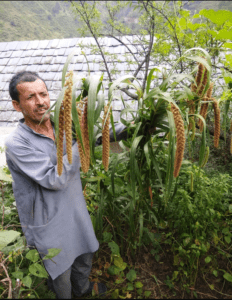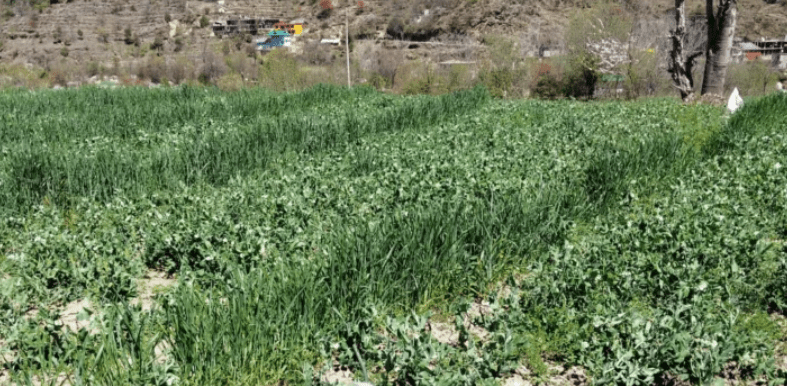MANDI: Asha Ram of Naroli village in Mandi district has embraced Subhash Palekar’s natural farming and it is proving that sustainable, chemical-free agriculture can be both environmentally friendly and financially rewarding.
Cultivating a variety of crops on 5.5 bighas of land without using any chemicals, Asha Ram is earning an annual income of Rs 1.5 lakh, showing the potential for a future of clean farming in Himachal Pradesh.
Spark that triggered change
Asha Ram grew increasingly disturbed by the harmful effects of chemical-laden farming, both on human health and soil quality. “The frequent reports of rising diseases and the excessive use of chemicals in farming were unsettling. The soil was deteriorating and yields were declining,” shares Asha Ram. Concerned about the long-term impacts, he decided to adopt Subhash Palekar’s natural farming techniques, which rely on traditional, chemical-free methods.
In 2018, Asha Ram attended a month-long seminar on Subhash Palekar’s natural farming at Yashwant Singh Parmar University of Horticulture and Forestry, Solan, under the Agricultural Technology Management Agency (ATMA) project. Equipped with knowledge and a new found passion, he implemented the techniques on his 5.5 bighas of land.

Harvesting fruits of natural farming
Today, Asha Ram is successfully growing wheat, peas, kidney beans, maize, ancient grains, cauliflower, mustard and barley using the natural method. Additionally, he has planted a pomegranate orchard with varieties like Mridula, Kandhari, Kandhari Kabuli and seedless Dolka, all cultivated without chemicals. “The results have been excellent,” he says proudly.
Earnings surge from sustainable farming
Asha Ram’s switch to natural farming has paid off handsomely. His pomegranates, which are sold locally in Karsog, are highly sought after, particularly by government employees, ensuring a steady income. From pomegranate farming alone, he earns Rs 80,000 to Rs 90,000 annually. Combined with other crops, his total yearly income reaches Rs 1.5 lakh. “This method of farming not only provides me a good income but also preserves the soil and boosts its health,” Asha Ram notes.
Reduced costs and healthier soil
Before adopting natural farming, Asha Ram spent around Rs 22,000 to Rs 25,000 on chemical inputs like fertilisers and pesticides. Now, his monthly farming expenses have plummeted to just Rs 3,000 to Rs 4,000, thanks to the self-sustaining nature of natural farming. His fields are also healthier, with a noticeable increase in beneficial insects and improved soil fertility.
State support and community impact
Recognising Asha Ram’s efforts, the Himachal Pradesh government, under the ATMA project, provided him with a grant of Rs 18,000 — Rs 8,000 to improve his cowshed and Rs 10,000 to build a resource store. The support has made his farming journey easier.
Asha Ram is now a beacon of hope for farmers in surrounding areas. Farmers from various districts visit his fields to learn about natural farming and Asha Ram himself is dedicated to encouraging others to switch to chemical-free agriculture. His vision is to transform Naroli into a model village for natural farming.
Recognition from experts
Mohan, the Block Technology Manager (BTM) of ATMA in Karsog, commended Asha Ram’s success, stating, “By adopting Subhash Palekar’s natural farming methods, Asha Ram has not only transformed his own fields but has also sparked a new hope for sustainable farming in the region. The department continues to support him in every way possible and his success is a shining example for other farmers.”
Asha Ram’s story is one of dedication, innovation and the power of nature—a testament to the potential of natural farming to revolutionise agriculture in Himachal Pradesh and beyond.





